Got an Itchy Dog?
Understanding and Managing Allergies in Dogs
Achoo! Did you know that allergy season for dogs typically starts in August? There's just something about this time of year that triggers a shift in the environment that leads to an uptick in fall allergies for our pets. Dogs that have been symptom-free suddenly begin to experience issues like itchy ears, ear infections, red and irritated skin, constant chewing, and even skin infections.
In this blog, we'll explore the three leading causes of pet allergies, the signs and symptoms to watch for, how your veterinarian diagnoses allergies, and, most importantly, how to help your pet navigate allergy season.
Allergies in Dogs
Allergies in dogs share many similarities with those in humans. When a dog's immune system identifies something that is a harmless substance as a threat, it mounts a defensive response. This response, intended to be protective, leads to various symptoms.
Common symptoms across different types of allergies include itching, scratching, licking, and skin inflammation. Allergies in dogs can show up as a variety of symptoms, which can vary depending on the cause of the allergy. However, there are some distinctions based on the specific allergen.
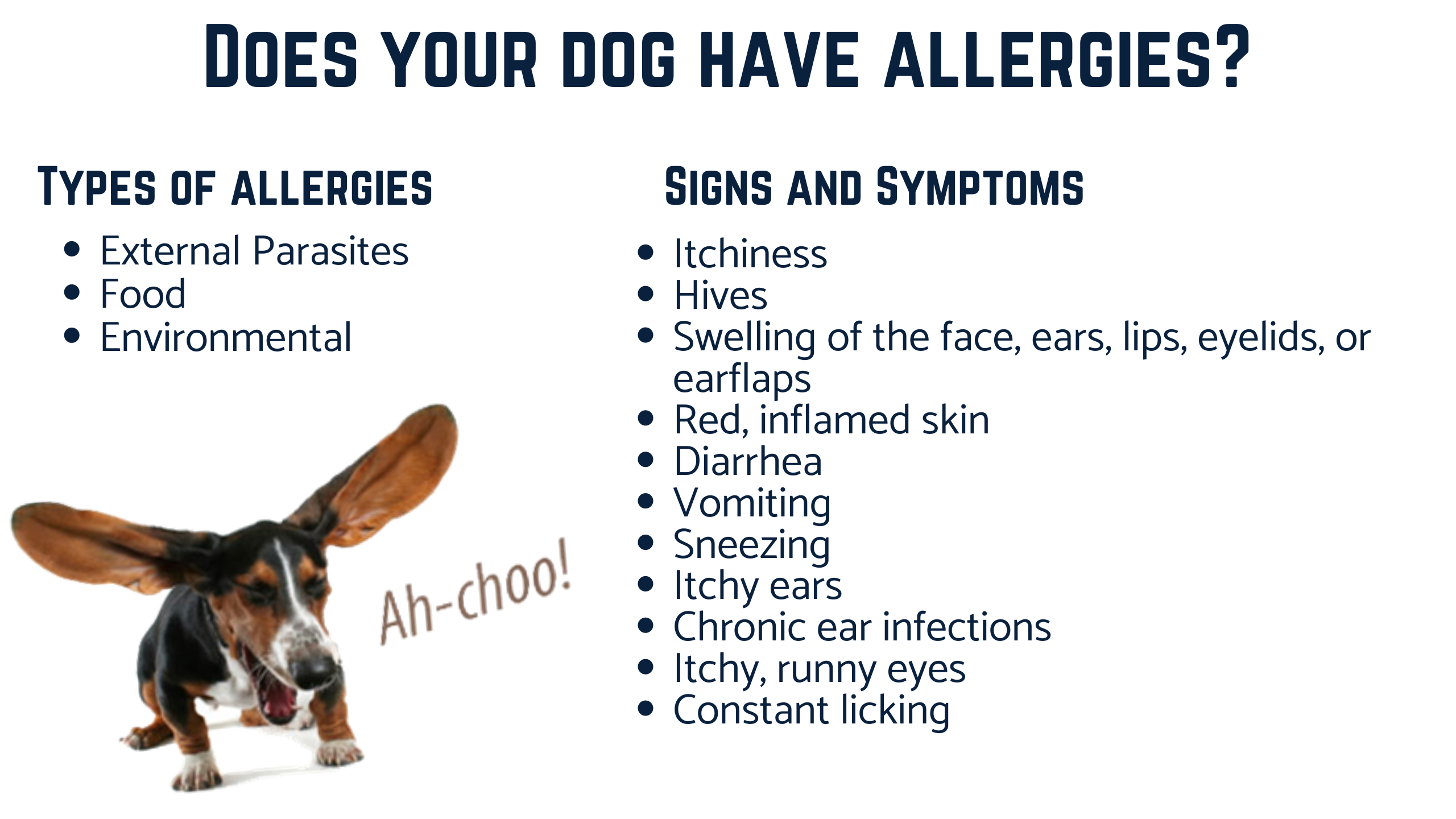
What Causes Allergies in Dogs?
Dogs typically experience allergic reactions due to one or a combination of three primary causes: external parasites, food allergies, and environmental factors.
External Parasites
External parasites, such as fleas and ticks, are the most common cause of allergies in dogs. A flea allergy typically causes intense itching, especially near the base of the tail. Dogs may also experience redness, swelling, and scabbing due to flea bites.
To rule out fleas and other external parasites as the cause of your dog's allergies, at Buddy's Vets, we recommend year-round flea and tick preventatives such as NexGard. Ensuring your pet is on a preventative is crucial, as it quickly eliminates external parasites from the list of potential causes. (For more information on ticks and how to protect your pet, check out our blog on ticks.)
The most common parasites that cause itching in dogs are fleas, demodex, and sarcoptic mange. Modern products like NexGard effectively address these parasites, reducing the need for extensive diagnostics. If your dog has a skin infection, we may perform tests like impression smears or ear swabs to check for bacteria or yeast that need treatment.
Being consistent with your pet's flea and tick preventative not only protects your dog from discomfort but also streamlines the diagnostic process.
Food
Food allergies in dogs can show up through a variety of symptoms. Food allergies often cause gastrointestinal symptoms like vomiting, diarrhea, excessive gas, and skin issues such as itching, hives, and face puffiness. Dogs with food allergies frequently scratch their ears, lick their paws, and may experience recurrent ear and skin infections. Additionally, symptoms can include an itchy butt, itchy feet, and a lack of response to typical allergy medications. If your dog vomits frequently, has diarrhea, or shows persistent itching despite treatment, it could be a sign of a food allergy.
There is no blood test or magic pill to help diagnose food allergies in dogs. The only way to know if your pet has a food allergy or sensitivity is to do a food elimination trial. Food trials in dogs are performed exclusively with hydrolyzed foods.
Hydrolyzed protein foods break down proteins into small particles the body doesn't recognize as allergens. Even though these foods may contain an ingredient listing of corn starch, chicken, and many other items, the food is hydrolyzed or broken down into small particles that the body doesn't recognize as an allergen. This process, known as hydrolysis, takes the protein in the foods, whether meat or vegetable, and reduces it to a size the immune system does not identify as a threat.
During a hydrolyzed protein diet trial, the dog is to be fed only this specific diet for 4-6 weeks and nothing else. At Buddy's Vets, we prefer using Science Diet z/d, a prescription food. We take 14 days to transition the dog to the new food, then feed it exclusively for the trial period.
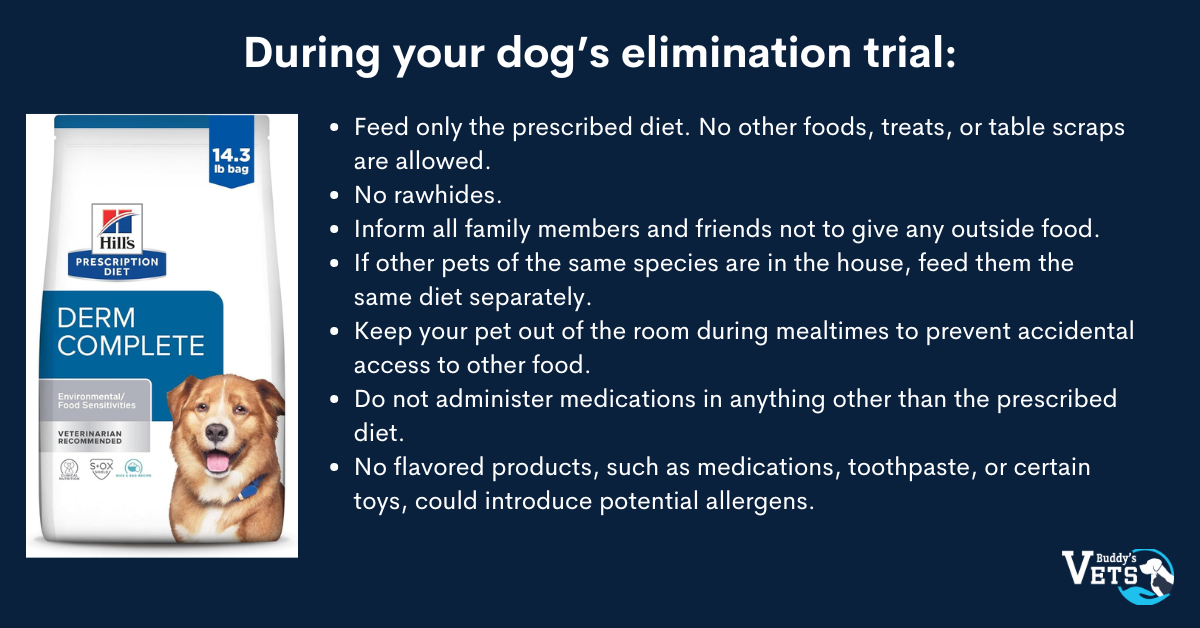
If the dog does well on the hydrolyzed diet, we reintroduce the original food to see if symptoms return. If symptoms reappear, it indicates a food allergy. Further testing can then identify the specific allergen. If a food allergy is confirmed but the particular protein is unknown, we may switch to novel protein sources such as venison, rabbit, or bison. These alternatives are less likely to cause allergic reactions. They are typically grain-free, such as salmon and sweet potato or salmon and sweet peas.
** Your veterinarian should supervise any food elimination trials and include consistent communication and regular check-ups.
Environmental
Environmental allergens, such as pollen, dust mites, and mold spores, can lead to atopic dermatitis, which results from a dog's immune system reacting to airborne allergens. Atopic dermatitis in dogs often causes persistent itching, scratching, and biting, particularly around their paws and ears. Dogs can also have inflamed skin and may develop rashes, hives, or hot spots. Some dogs experience frequent ear infections or respiratory symptoms like coughing and sneezing.
These allergens are often seasonal and cause flare-ups in the spring and fall, but some dogs may experience symptoms year-round depending on the specific allergens. If not addressed, atopic dermatitis can worsen over time and become a serious health issue.
With atopic dermatitis, several methods exist to determine what your pet is allergic to. Your veterinarian will take a thorough medical history, review your dog's symptoms, and perform a physical examination to check the skin for signs of inflammation and infection. At Buddy's Vets, we also utilize a specific blood test through HESKA labs to check for potential allergens, which is a simple blood draw and provides valuable insights into what your dog may be allergic to.
Additionally, you can consult a veterinary dermatologist for intradermal skin testing to identify specific allergens. Another approach to consider is allergy vaccinations, which can help desensitize your dog to the identified allergens.
Once you determine that your dog is affected by environmental allergens, various options are available to help reduce allergic responses and alleviate symptoms. Working closely with your veterinarian will help determine the best treatment plan for your dog.
For patients suspected of having seasonal allergies, at Buddy's Vets, we start with:
Atopic dermatitis is a chronic condition that requires ongoing management. Regular veterinary check-ups and a consistent treatment plan are essential to keep symptoms under control and improve your dog's quality of life.
Real-Life Example: Managing Creed's Allergies Year-Round

Meet Creed. Creed suffers from severe allergies year-round. When his allergies flare up, they can be particularly intense. During an annual exam and vaccinations, Dr. Becky Krull of Buddy's Vets provided a detailed plan to manage Creed's allergies and keep him comfortable. Creed's owners doubled his allergy medication for two weeks and added a steroid, antibiotic, and anti-inflammatory. Creed also received an allergy shot to help with the itching, which he'll get monthly, and ear medication due to a small amount of yeast in his ears. Additionally, they started using a topical spray.
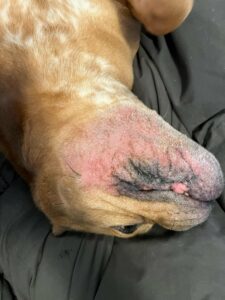
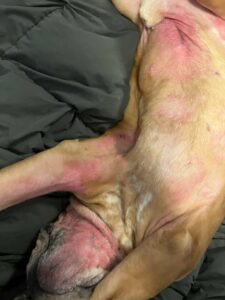
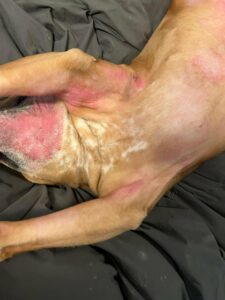
Creed benefits from weekly baths, sometimes twice a week, with a medicated shampoo, and his owners wash his blankets weekly. Although this may seem extensive, Creed, a rescue from Texas, needs help adjusting to the Northeast Wisconsin environment.
Creed's owners are grateful to Dr. Becky and her team at Buddy's Vets for the effective treatments that significantly improve his quality of life.
Managing Your Dog's Allergies: A Lifelong Commitment
Allergies in dogs can be frustrating because there is no cure for allergies. Allergies are manageable. Effective management involves proactively minimizing flare-ups and ensuring your pet's comfort. When allergies are well-managed, your dog will need less medication and fewer vet visits, and it will cost you less. On the other hand, untreated allergies can lead to increased suffering for your dog, higher costs, and more frequent vet visits.
The goal is to find the best combination of treatments for your pet. Managing allergies is a lifelong process, not a one-time fix. Owner compliance is crucial. While there is no perfect treatment for allergies in dogs, we strive to find what works best for each patient, ensuring your dog's comfortable and happy life.
At Buddy's Vets, we are here to guide you and your pet every step of the way. If you suspect your pet has allergies, don't delay—call us today.
